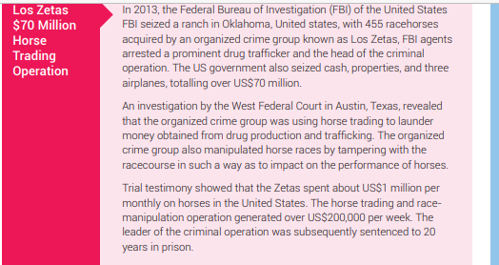
Game Over:- UNODC Exposes the Link Between Corruption and Organized Crime in Sport.
30/10/2024
The launch of a new UNODC report, titled” Game Over: Exposing the linkages between corruption, serious and organized crime in sport,” marks a significant step in the global fight against corruption in sports.
The findings of this report are of utmost importance, as they shed light on the pervasive issue of corruption and organised crime in the sports industry.
The report, featuring case studies and practical, evidence-based recommendations, offers a beacon of hope in the global efforts to address the infiltration of organized crime groups in sports. Contributed by 90 experts across 32 countries and 13 representatives from 11 organisations, these recommendations are designed to be implementable and effective.
Key Points of the Report:
- Money Laundering through Athlete Transfers: Criminal organisations use the transfer of athletes, especially young football players, to disguise illicit financial flows. Unlicensed agents and intermediaries often target poor areas and exploit young talent for financial gain. Funds generated from these activities disappear into complex laundering schemes involving multiple companies and countries, making oversight increasingly challenging.
- Illegal Betting and Match Manipulation: The proliferation of online betting has significantly increased the risks of match-fixing, which is often used as a vehicle for money laundering. Advanced technologies like cryptocurrencies and anonymous payment platforms further exacerbate the issue by facilitating anonymity and quick transactions. Lower-tier events and youth competitions are particularly vulnerable due to lower surveillance and easier access to illicit operations.
- International Collaboration: The global nature of these illicit activities, as highlighted in the report, demands urgent and close international cooperation. The report underscores the importance of cooperative networks among sports authorities, justice entities, and international organizations to facilitate real-time data and information exchange. Centralised, secure platforms would allow monitoring of suspicious betting patterns and financial transactions, helping combat money laundering in sports.
Case Studies Included in the Report:
- Match Fixing in Tennis: A criminal organisation in Belgium exploited betting on lower-profile tournaments, generating millions in illegal profits.
- Human Trafficking in Sports Academies: A football academy in Portugal was involved in trafficking minors for exploitation.

- Money Laundering through Horse Racing: The Los Zetas cartel used horse racing and trading in the U.S. to launder profits from drug trafficking.

More cases are listed.
- Horseracing doping scheme in the United States
- Linkages between football and organised crime in Mexico
- Bribery in biathlon
- Competition manipulation and money[1]laundering in Ireland
- Operation ‘Cyclone’ Unveils Drug Trafficking Network Linked to Spanish Football
UNODC will continue to advance research on the connection between corruption in sports and other crimes, drawing on past experiences and international best practices to develop solutions that maintain integrity in the sports arena.
Source
The Team
Meet the team of industry experts behind Comsure
Find out moreLatest News
Keep up to date with the very latest news from Comsure
Find out moreGallery
View our latest imagery from our news and work
Find out moreContact
Think we can help you and your business? Chat to us today
Get In TouchNews Disclaimer
As well as owning and publishing Comsure's copyrighted works, Comsure wishes to use the copyright-protected works of others. To do so, Comsure is applying for exemptions in the UK copyright law. There are certain very specific situations where Comsure is permitted to do so without seeking permission from the owner. These exemptions are in the copyright sections of the Copyright, Designs and Patents Act 1988 (as amended)[www.gov.UK/government/publications/copyright-acts-and-related-laws]. Many situations allow for Comsure to apply for exemptions. These include 1] Non-commercial research and private study, 2] Criticism, review and reporting of current events, 3] the copying of works in any medium as long as the use is to illustrate a point. 4] no posting is for commercial purposes [payment]. (for a full list of exemptions, please read here www.gov.uk/guidance/exceptions-to-copyright]. Concerning the exceptions, Comsure will acknowledge the work of the source author by providing a link to the source material. Comsure claims no ownership of non-Comsure content. The non-Comsure articles posted on the Comsure website are deemed important, relevant, and newsworthy to a Comsure audience (e.g. regulated financial services and professional firms [DNFSBs]). Comsure does not wish to take any credit for the publication, and the publication can be read in full in its original form if you click the articles link that always accompanies the news item. Also, Comsure does not seek any payment for highlighting these important articles. If you want any article removed, Comsure will automatically do so on a reasonable request if you email info@comsuregroup.com.


